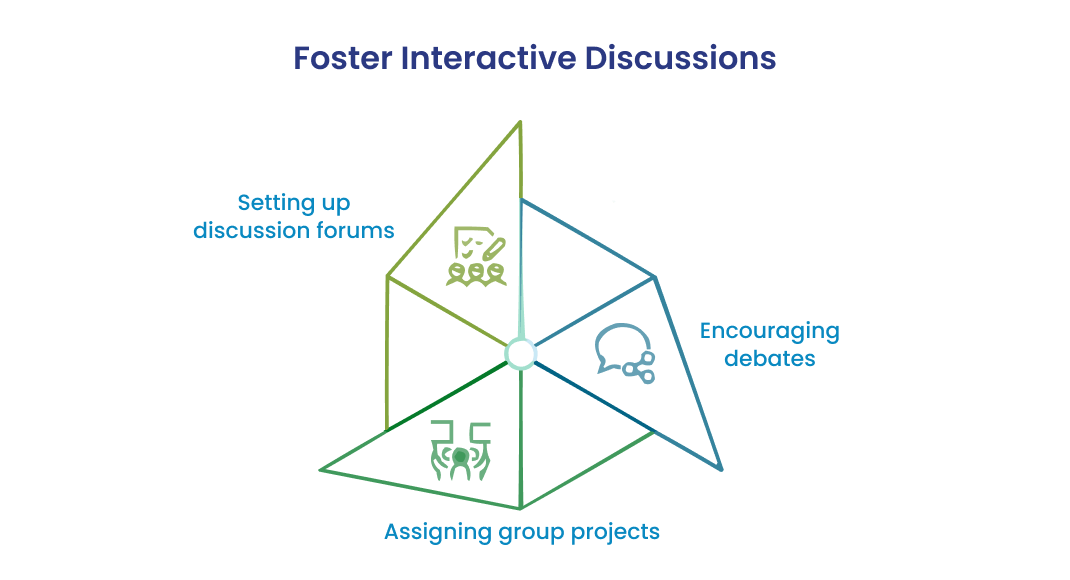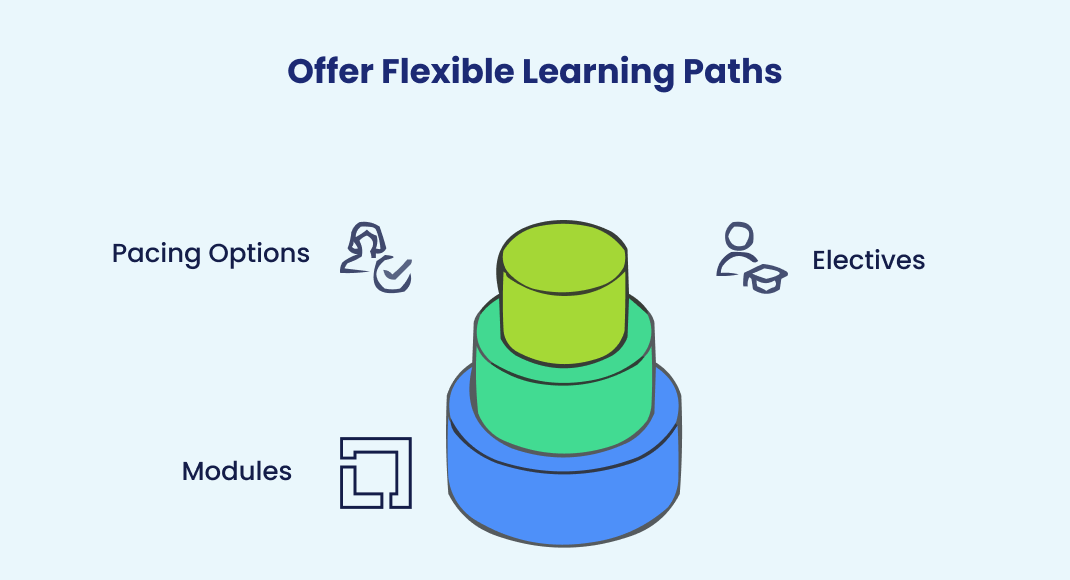10 Tips for Effective Online Learning
List of 10 Tips for Effective Online Teaching
Exploring Effective Online Teaching: Pros and Cons
How MITAOE Helps their Students in Online Learning
What best describes online learning?
Online learning is flexible, engaging and globally accessible; a modern way to learn without limits. It combines interactive expert-led virtual sessions and advanced digital tools. At MIT AOE; students experience world-class education through immersive online platforms that encourage collaboration and independent learning. This creativity empowers them to be successful in an ever-evolving and technology-driven professional landscape. With personalised learning paths, real-time feedback and global networking opportunities, students gain practical knowledge and digital fluency essential for success in future-ready careers.

According to a study by Snyder, Brey, and Dillow on ResearchGate, it's projected that by 2025, approximately 43.1% of university students worldwide will have enrolled in at least one online course, reflecting the significant growth from 15.6% in 2016. This striking statistic highlights the rapid evolution of the online learning revolution, spurred by leaps in technology in education.
Traditional brick-and-mortar classrooms are increasingly giving way to virtual learning platforms. This seismic shift underscores the growing importance of effective online learning, ensuring learners can tap into the myriad opportunities that digital education offers.
The share of students enrolled exclusively in online programs grew from just 3.9 %s in 2008 to 23.4 % in 2020 in the U.S., illustrating the rapid mainstreaming of virtual learning.
List of 10 Tips for Effective Online Teaching
Online teaching has unlocked doors to global knowledge without geographical constraints. With the advantage of online learning being its accessibility, teachers have the responsibility to make the experience worthwhile.
Here are some tested and proven methods to ensure effective online teaching:
Set Clear Learning Objectives
In any distance learning course, clarity is the foundation. Before diving into course content, it's essential to establish what the students should achieve by the end of the course. Clearly defined objectives provide a roadmap for students, letting them know what is expected of them.
This also helps educators in structuring content and assessments that align with the objectives, ensuring that the learning journey is coherent and purposeful.
Use Engaging Multimedia Content
Incorporating videos, animations, and infographics enriches content and makes it more engaging for readers. Remember, everyone learns differently; some might be visual learners while others prefer auditory content.
Offering diverse content caters to different learning styles, ensuring a more holistic approach to teaching.
Retention rates for online learners can reach up to 60 %, compared with 8–10 % in traditional in-person learning environments, when multimedia is effectively used.
Foster Interactive Discussions
One of the most effective online learning strategies for success is to promote interactive discussions. It's not just about the delivery of content but also ensuring active engagement.
- Setting up discussion forums
- Encouraging debates
- Assigning group projects
can foster a sense of community and enhance collaborative learning.

Provide Timely and Constructive Feedback
Feedback is a cornerstone of learning. Students benefit immensely when they know where they stand, what they've done right, and where they can improve. In the virtual environment, it becomes even more crucial to provide timely feedback, helping students rectify mistakes and grow.
Maintain Consistent Communication
Effective online learning relies heavily on communication. It's essential to establish open channels where students can reach out with their doubts, questions, or concerns. Regular check-ins, announcements, and updates create a sense of community and make learners feel supported throughout their online journey.
Utilise Diverse Assessment Methods
One size doesn't fit all, especially in the assessments. Effective approaches to online learning involve integrating a variety of assessment methods. This could range from
- Quizzes
- Peer assessments
- Projects
- Presentations
- Reflective journals
By diversifying assessment techniques, educators can cater to different learning styles, ensuring a comprehensive understanding of subjects and fostering critical thinking.
Design a User-Friendly Virtual Classroom
A well-structured and intuitive virtual classroom can drastically improve the learning experience. It's essential that students can easily navigate through the content, participate in discussions, and access resources without any hindrance.
- Simple layouts
- Clearly labelled sections
- Consistent formatting
play a crucial role in making the virtual classroom conducive to learning.
Offer Flexible Learning Paths
The beauty of online learning is the flexibility it offers. Given the vast audience, like students from different btech colleges in India, it's essential to provide multiple learning paths. This means offering various
- Modules
- Electives
- Pacing Options
that cater to different learners' needs.
Some might prefer a fast-paced module while others may want to take things slow. Recognising and accommodating these needs can greatly enhance the online learning experience.

Encourage Peer Collaboration and Group Work
Collaboration is the key to enhanced learning. By fostering an environment where students can collaborate on
- Projects
- Discuss topics
- Even debate
educators promote a sense of community and shared learning.
Such group activities can mirror real-world scenarios where teamwork and communication are crucial, thus preparing students for a professional life in future.
Continuously Update and Improve Content
The digital world is ever-evolving. What was relevant a year ago might not be today. To ensure online learning effectiveness, it's crucial for educators to regularly review, update, and refine their content.
Whether it's
- Integrating recent case studies
- Tweaking modules based on feedback
- Incorporating new multimedia elements
Continuous improvement ensures that the course remains current, relevant, and engaging.
Exploring Effective Online Teaching: Pros and Cons
In today's educational landscape, the surge in online learning has led to the evolution and application of various teaching methodologies. Central to this has been the integration of strategies for effective online learning, designed to maximise engagement and comprehension in a digital realm.
While online teaching has been a beacon for many, it also comes with its unique set of challenges.
Pros:
- Provides flexibility in terms of time and location.
- Allows for a diverse range of multimedia content to enhance understanding.
- Offers personalised learning paths, catering to the individual pace of learners.
- Reduces geographical barriers, giving global access to quality content.
- Promotes tech-savvy learning, an essential skill in today's digital age.
Cons:
- Can lead to feelings of isolation without in-person interactions.
- Requires a certain level of tech proficiency, which might be a challenge for some.
- Possible distractions in a home environment can impede learning.
- Network or technical issues can disrupt sessions.
- Lack of physical presence might lead to reduced motivation or accountability in some learners.
How MITAOE Helps their Students in Online Learning
MIT AOE, renowned as one of the best autonomous institute affiliated with SPPU’ has been at the forefront of adapting to the challenges of the pandemic. Recognising the importance of uninterrupted education, the institution has employed a number of advanced facilities to ensure seamless delivery of content to its students.
Amidst the pandemic, the institution has successfully conducted around 40 live sessions, spanning students from every year and program. A testament to their commitment is the overwhelming participation, with an average attendance rate of 90%.
Additionally, an impressive number of 5000 people registered to be a part of these crucial online classes. Through these efforts, MIT AOE exemplifies how dedication and adaptability can lead the way in modern education.
OUR RECENT BLOG



